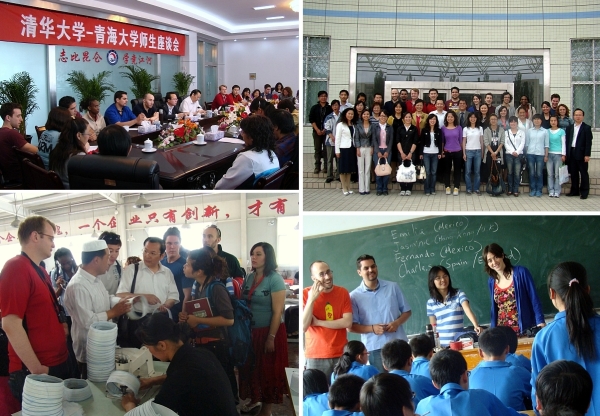A group of international students from the Master of International Development (MID) program at SPPM completed their social practice in Qinghai province from 13-18 June. The group of 12 students from nine different countries investigated China's cultural industry, ethnic minorities and rural development policy. The group was led by Professor Wang Youqiang and Assistant Dean Meng Bo. Through their field visits, the group were able to meet with teachers and students from Qinghai University, local government officials at all levels, local businesses, public servants and local villagers. This provided an opportunity for students to learn the basis of the social and economic development challenges facing Qinghai province.
Before leaving for social practice, the students first met with the Vice-Governor of Qinghai province, Dr Gao Yunlong, who was also a Tsinghua alumni. During the meeting, the Vice-Governor talked about the western development strategy focusing on local education, environmental protection, energy and national policies and the helpful role that students play in doing their social practice in Qinghai province. The lively discussions that followed gave students a wealth of information that would assist in their upcoming trip to Qinghai.

On June 13, the MID group departed from Beijing by train on a 26 hour journey to Xining City, capital of Qinghai province. The group was warmly welcomed by teachers and students from Qinghai University and a meeting was held to discuss various issues surrounding Qinghai’s natural resources, its economic development strategy, environmental protection, sustainable development, public policy and education of ethnic minorities. Everyone openly shared their own ideas for the future planning of the province. In addition, the MID group visited the Salar Autonomous County to investigate this ethnic minority and how it developed its local garment industry to be an international market leader in the global Muslim clothing market. The group also had a chance to examine the local arts and crafts industry that utilizes the natural resources from the Yellow River and were invited by farmers to see how government policies were supporting the development of the Salar community. During the last day of the trip, the MID students carried out teaching activities at a local high school by giving English lessons. It was a lively session where the students and teachers participated in many word games and activities.
In addition to the social practice, the MID group also visited Qinghai Lake and Taer Monastery, two of the most well-known sites in Qinghai. At Taer Monastery students got to know more about the Tibetan culture, its heritage and development. At Qinghai lake, students were able to enjoy the natural scenery of one of the most pristine natural environments in China. During the 6-day social practice, the MID students were able to gain a better understanding of the China's development strategy and the challenges it faces. Upon completion of their social practice, students will be required to prepare a research report comparing their own country’s development, what they have experienced during their social practice and their vision for future development.
